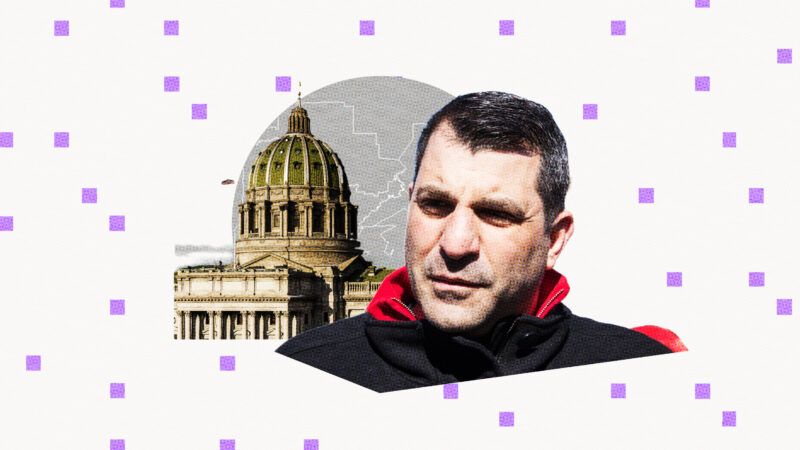For the First Time, Pennsylvania Might Have an Independent Speaker of the House
A declaration of independence capped a wild day in Pennsylvania's State House.

Believe it or not, the craziest political drama on Tuesday wasn't the historic and unpredictable scenes that played out in Congress—where, as of this writing, lawmakers have tried and failed five times to determine who will be the next speaker of the House of Representatives.
That's nothing compared to what happened about a hundred miles north of D.C. on Tuesday afternoon, where members of the Pennsylvania State House met in Harrisburg to hold their leadership vote.
As in Congress, Republicans came into the day with a slim majority in the Pennslyvania House. As in Congress, neither party could put forward a candidate for speaker who could win a majority of votes.
Then, things got wild: With the body deadlocked, lawmakers moved to adjourn the session. That vote also failed—meaning members could not even agree to go home. Since the alternative was being stuck together in what one statehouse reporter called "legislative purgatory," the lawmakers decided they might as well try to pick a speaker. A Democratic representative won that vote—with the support of more than a dozen Republicans—then immediately declared himself to be an independent (even as Democrats reportedly disputed the notion that he'd leave the party).
And, honestly, that's just the final act of what's been a completely bonkers two months in Pennsylvania politics.
Tuesday's chaos began on Election Day, when Democrats swung 12 state House seats. That seemed enough to give Democrats majority control of the chamber for the first time since 2010—a fitting end to what had been an especially disappointing election cycle for Republicans in Pennsylvania.
But the Democrats' 102–101 majority was always a mirage. Because one of their members was dead.
State Rep. Anthony DeLuca (D–Penn Hills) died in October, but that was after the deadline to replace a candidate on the ballot. In December, the Pennsylvania Legislative Reference Bureau, which serves a nonpartisan referee function similar, in some ways, to the role of the U.S. Senate's Parliamentarian, ruled that "an individual must at least be elected and living to qualify as a member of a legislative caucus." Therefore, Democrats did not have the majority.
Then they fell into the minority. Two Democratic state representatives had won other elections in November—Austin Davis is the lieutenant governor–elect, and Rep. Summer Lee (D–Penn.) is now a member of Congress—and as a result, both had to resign their posts in the Pennsylvania House.
So Republicans entered Tuesday's first day of the legislative session with a fraught 101–99 majority. When the dust cleared, however, it was Rep. Mark Rozzi (D– or maybe I–Reading) elected speaker of the Pennsylvania House.
"The commonwealth that is home to Independence Hall will now be home to this commonwealth's first independent speaker of the House," Rozzi said during a brief speech on the House floor Tuesday, according to Spotlight PA. "I pledge my allegiance and my loyalty to no interest in this building, to no interest in our politics. I pledge my loyalty to the people of the Commonwealth."
Later, he seemed to backtrack that declaration of independence, according to the Associated Press, telling reporters that he viewed the role of the speaker as a "nonpartisan officer of the House, entrusted with maintaining the integrity of the House" and refusing to answer whether he'd actually switch his registration to independent.
There may still be more twists to come. If Rozzi becomes independent and Democrats win the three special elections to fill the seats vacated by Davis, DeLuca, and Lee, the Pennsylvania House would be split evenly, 101–101–1.
Pennsylvania has had at least one House speaker from a minority faction. From 2007 through 2008, then-Rep. Dennis O'Brien (R–Philadelphia) served as speaker while Democrats held a one-seat majority in the House. But Rozzi would be the first independent to hold the gavel in the Pennsylvania House's history.*
In other states, there are a few precedents, according to Mick Bullock, a spokesman for the National Conference of State Legislatures. The most recent example, Bullock tells Reason, came from Alaska, where Rep. Bryce Edgmon (I–Dillingham) left the Democratic Party to become speaker in a coalition government formed in 2019.
As American politics becomes more fragmented, the ability to forge coalitions defined by something other than partisan loyalty may become more important. That can only be a good thing for the future of democracy.
And if Rozzi can live up to his promises on Tuesday, he'll be someone to watch.
CORRECTION: This piece misstated the age of the Pennsylvania House of Representatives in the headline and text. The first session was held in 1682.


Show Comments (27)